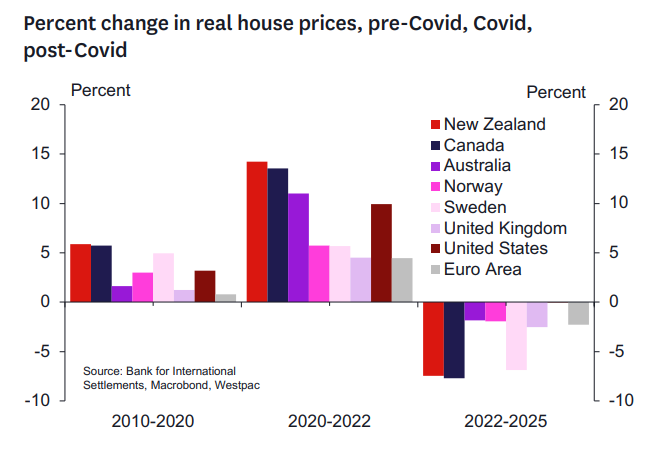Westpac Sees the Sluggish Housing Market Will Recover in 2026

The real estate market in New Zealand "remains comatose" after the excessive boom during the pandemic period, according to the latest Economic Bulletin by Westpac Chief Economist Kelly Eckhold.
House prices have remained flat so far this year, even as interest rates have been significantly lowered, and they are expected to remain stable for the rest of this year, the report says.
However, Eckhold is predicting 5.4% house price growth next year.
The report says house prices rose at a rapid clip through most of the period between the Global Financial Crisis and the onset of the Covid-19 pandemic.
"Real house prices rose at an astonishing 6% annual rate that decade," it says.
"Few other developed markets achieved such growth. Steadily lower interest rates combined with strong migrant-driven population growth to generate the uptrend in house prices," Eckhold says.
"Pre-Covid, the Official Cash Rate was cut by 75 basis points to 1.0% - during Covid, the OCR was cut by a further 75 basis points to 0.25%."
"In addition, the Reserve Bank undertook considerable quantitative easing, removed macroprudential restrictions on housing lending and issued forward guidance implying a long period of very low interest rates," the report says.
"These accommodative policy settings supercharged a housing market that already had significant momentum," Eckhold says.
During the Covid period New Zealanders plunged into mortgage debt boots and all, with the value of new mortgages taken out peaking at an annual rate of about $100 billion as banks shoveled money out the door. In February 2021 Shayne Elliott, CEO of Australia's ANZ Group, parent of NZ's biggest bank ANZ NZ, highlighted record volumes in ANZ's NZ home loans business saying; "we’ve been really run off our feet there in terms of supporting Kiwis into homes."
Westpac Bank is the third-largest home lender in New Zealand. As of June 30, its total loan amount reached $69.6 billion.
Eckhold stated that during the pandemic, the actual increase in house prices in New Zealand was still higher than in other markets, which led to a significant rise in house prices.
"Investors saw value in housing at such low interest rates and behaved as if interest rates would be very low for a very long time."
"The result was a severe and unsustainable spike in house prices in both real and nominal terms, but the fundamentals underlying these price rises were not sustainable, as ultimately, inflation and interest rates rose and house prices fell," the report says.
"Countries that were most overvalued - New Zealand and Canada especially - fell by the most, so that much of the increase in real prices that occurred over the 2020-21 period was eventually unwound," it says.
"Since 2023 house prices in New Zealand have been stable on a nominal basis and falling further on a real basis."
"This year to date we have seen no growth in prices at the national level, albeit with some variation across the country... the weakness in house prices is more prevalent in the largest urban areas which are not directly exposed to improvements in export returns driven by strong commodity prices," says Eckhold.
"While house sales have increased over the past year and the median time to sell has been stable to falling, new housing demand has been balanced by increasing supply - including that provided by new construction - so that the inventory of unsold homes has remained at around a decade high."
"Given the supply in the market, there has been little need for buyers to bid prices higher," the report says.
Next year Eckhold says Westpac's economists expect a gradual lift in momentum will see house price growth of about 5.4%.
"Demand for both owner-occupier and investor housing should strengthen as the broadening economic recovery, and crucially an upturn in the labour market, encourages the formation of new households, including migrant households. Over time, this should eat into the current stock of unsold inventory and so reduce the current downward pressure on real house prices."








